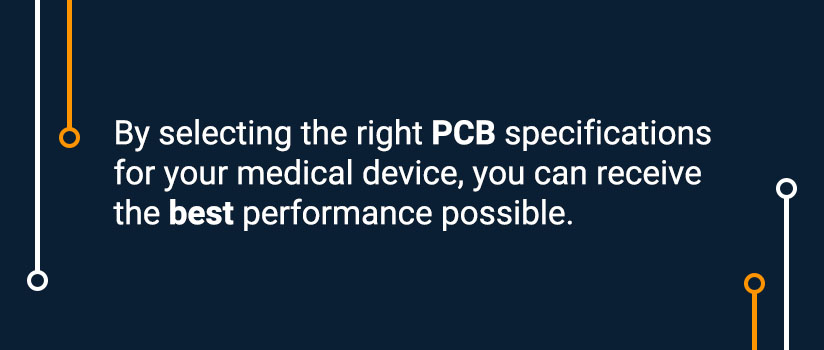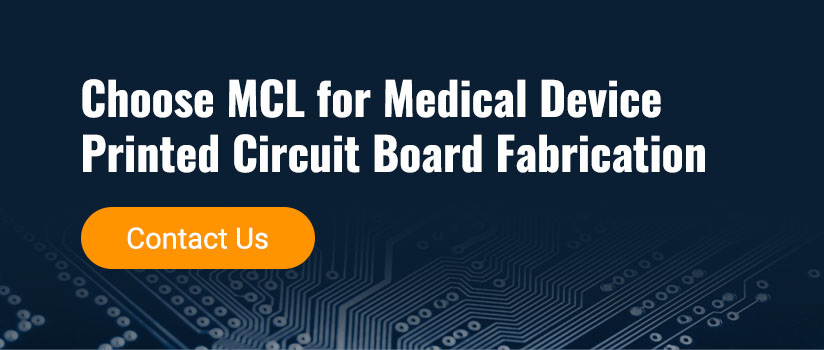PCBs for Medical Applications
The medical sector encompasses a diverse array of applications, all with the overarching goal of enhancing and saving lives. While we acknowledge the challenges within this field, such as assuring product quality, securing IoT integration and data, and managing the costs of product development, we remain committed to delivering solutions that make a difference.
We are dedicated to addressing these challenges proactively The applications below are specifically designed to drive innovation, improve product quality, and contribute to the overall well-being and cost-effectiveness of the medical sector.
- Blood Glucose Monitoring: PCBs for devices for daily diabetes management. Demands are typically size constraints, a long lifespan and high reliability.
- Flex | HDI | Rigid-Flex
- Blood Pressure Monitors: PCBs for wireless blood pressure reader, monitoring via mobile device. Demands are typically size constraints and high reliability.
- Medical Gas Administration and Measurement: PCBs for measurement of concentration and volume of medical gas. Demands are typically high reliability, size constraints.
- Medical imaging: PCBs for Magnetic Resonance Imaging (MRI) equipment. Demands are high speed signal, signal integrity and controlled stack-ups.
- Nurse Call and Alarm Systems: PCBs for hospital nurse call and healthcare alarms. Demands are typically high reliability, long life span.
- Ophthalmic Diagnostic: PCBs for ophthalmic diagnostic imaging and surgical products. Demands are typically high reliability.
- Oxygen Analysis and Distribution: PCBs for oxygen sensing, analysis and delivery solutions. Demands are typically high reliability.
- Perfusion Systems: PCBs for perfusion systems, either for patient transport or treatment in hospital. Demands are typically high reliability with a particular focus on shock resistance.
- Protective Healthcare Products: PCBs for powered and purified air respirators for protection of healthcare specialists. Demands are typically size constraints and critical operation.
- Respiratory Assistance: PCBs for sleep apnea treatment equipment. Demands are typically size constraints, a long lifespan and critical operation.
- Sensor Devices: PCBs for gas analyzers, blood test and pressure, ultra sonic, x-ray calibration, endoscopes and ECG. Demands are typically size constraints and a long lifespan.
- HDI | Multi-Layer | Flex
- Surgical Lighting: PCBs for surgical operation theatre lighting systems. Demands are typically heat management, long lifespan and critical operation.
- Ventilators: PCBs for life support ventilators. Demands are typically high reliability.
- Wearables: PCBs for oxygen delivery systems or eye tracking devices. Demands are typically size constraints.
- HDI | Multi-Layer | Flex | Rigid-Flex
MCL is ISO 9001:2015 certified. We partner with ISO 13485 compliant manufacturers specializing in medical applications to ensure your boards are certified for quality and reliability.
Give us a try for your Medical needs!
Millennium Circuits Limited (MCL) has been supplying custom printed circuit boards (PCBs) for medical devices for more than 15 years, and we’ve consistently ensured every board meets the highest quality standards for the medical community. Our quality assurance standards include various requirements around specialty materials, cleanliness, stringent processes, and support for a host of product types.
Printed circuit boards for medical devices are designed specifically for your medical instrumentation needs and a wide range of care settings, lab settings and testing scenarios. Precision is the core focus of medical instrumentation PCB fabrication from MCL, and our customers are always pleased with our results.
If you’re interested in PCBs for the medical industry, find out more about their main challenges and applications. Also, learn more about the core factors you’ll need to consider when designing medical grade PCBs and how we can help you.
Challenges of Medical Industry PCBs
PCBs for the medical industry must meet a few different requirements to ensure they’ll deliver the performance required. A few of the main challenges a PCB provider must be aware of when sourcing medical PCBs involve ensuring their PCBs meet compliance, size and reliability standards. Review some more information about the primary challenges PCB manufacturers must address with their PCBs below:
- Compliance: One challenge for companies looking for medical devices is that they need to work with PCB manufacturers who can manufacture to Class 3 electronic requirements. Since medical devices and equipment fall under this class, a company with expertise in producing Class 3 electronics will be more likely to produce PCBs meeting compliance standards. PCB manufacturers must also keep detailed records, with lot tracking being especially important. Medical industry PCBs must also adhere to installation qualification, operation qualification and process qualification standards. We partner with ISO 13485 compliant manufacturers specializing in medical applications, we ensure your boards are certified for quality and reliability.
- Size: Due to the trend of companies wanting smaller and smaller electronics, medical industry PCBs often have to have a miniature construction to fit in smaller medical devices. A good PCB provider will know how to properly craft tinier PCBs that still provide top-tier performance.
- Reliability: Since medical equipment outfitted with PCBs is often used for lifesaving purposes, they need to be reliable. Medical devices and the PCBs in them are often exposed to extreme temperature, liquid and shocks. Due to this possible exposure, medical PCBs must be able to work in potentially dangerous environments and deliver reliable results.
Factors to Consider When Designing Medical Grade PCBs
As you look for the right PCBs materials and specifications for your medical equipment and devices, you’ll have many different options to consider. By selecting the right PCB specifications for your medical device, you can receive the best performance possible. Check out some of the main PCBs used in the medical field and some of the top factors that make particular PCBs a good choice for certain applications below:
- Flexible PCBs: Flex PCBs are a top choice for many medical devices. Since medical devices are often placed in locations requiring flexibility, the malleable nature of flex PCBs makes them a great option. When a medical device will be folded and wrapped, turn to flex PCBs.
- Flexible aluminum PCBs: While flex PBCs are appropriate for many electronic medical devices, some high-power devices need a more powerful PCB. Flexible aluminum PCBs are perfect for high-power applications as they feature heat transfer qualities. Some top applications for these boards include scanning and surgical lighting applications.
- PCB microcircuits: Another factor you might want to consider is whether you want to utilize flexible PCB microcircuits. Like flex PCBs, PCB microcircuits are malleable, but they separate themselves by allowing you to utilize even smaller PCBs with greater performance. Due to their design, PCB microcircuits are often used in small medical devices, such as industrial sensors, wearable technology and hearing aids.
- Polyimide PCB material: As you look for the right base material for your PCB, polyimide is often a great choice. Polyimide PCB materials feature excellent tensile strength and flexibility. These materials are also highly durable, very thermally stable and chemically resistant, making them perfect for some medical devices, such as prosthetics and implants.
- Ceramic PCBs:Ceramic PBCs are a great choice for organizations using medical devices with circuits featuring a low coefficient of thermal expansion and high thermal conductivity. These PCBs can operate in extremely high temperatures, provide incredible high-frequency performance, easily implement high-density tracing and offer tough chemical erosion resistance.
- Rigid-flex PCBs: A rigid-flex PCB combines the benefits of flex circuits with the durability of rigid PCBs. The flexible materials sit in between rigid layers with conductors and are plated through holes to link them with other layers. These boards offer more durability than flex boards without the weight and size of rigid boards, presenting more design versatility. They’re common in applications like consumer electronics, lighting, contract manufacturing, instrumentation and more.

Our Capabilities
At MCL, we regularly help engineers and designers of medical instrumentation by providing complete medical device PCB fabrication and engineering support to bring your product to life. Our ability to generate high-frequency and high-density interconnect PCBs can be applied to medical devices.
Find out more about how our PCB capabilities can help you go from concept to market below:
- Prototyping: When you have a new product or design revision, MCL can help by providing you with PCB prototypes to test the design and PCB prior to going into production.
- Engineering support: Our team at MCL regularly provides engineering support services to customers, consulting with them to ensure PCB specs fit the budget and end application. Some of our top engineering solutions include Design Rule Check, Design for Manufacturability, cost consulting, stackup design, surface finish consulting and laminate and raw material considerations. All of these services mean we can help you craft PCBs to meet both your financial and quality needs.
- Fabrication: Alongside helping our customers by giving them engineering solutions and prototypes, we can oversee the fabrication process. Since the PCB manufacturing process is complicated, we have long-standing, strategic partnerships with domestic and overseas PCB facilities capable of providing our customers with high-quality products at an affordable rate. Boards are always produced by a best-fit factory for the type of PCB, complexity, and technology involved.
- Lifecycle: Once your PCB has gone through the engineering and fabrication processes, you can still expect MCL to help you once your PCB hits the market. Since we’re committed to assisting you throughout your entire PCB’s lifecycle, we’ll be there for you after a sale if your has PCB any issues or needs analysis. We also put any PCB we sell through several quality assurance measures to minimize the risk of future PCB issues. MCL is able to manage customers revisions to the board so our customers don’t have too.

Get a Free Quick Quote.

Medical PCB Applications
Due to the many types of PCBs, you can find them used in various applications in the medical industry. As you determine if you need PCBs, take a moment to review some of the top medical PCB applications below:
- Diagnostic devices
- Cochlear implants
- Smartphones and tablets for mobile health applications
- Imaging devices
- 2D and 3D sensors
- Implanted defibrillators
- Magnetic resonance imaging equipment
- Dental equipment
- X-ray computed tomography
- Infusion fluid controls
- Response neurostimulators
- Blood glucose and pressure monitors
- Monitoring devices
- Digital X-ray equipment
- Flex and rigid-flex interconnects for sensitive equipment
- Ultrasound equipment
- Flow rate and dispensing systems
- Body temperature monitors
- Imaging equipment
- Electrical muscle stimulation equipment
- Wearable medical devices
- Ultra-HDI circuit boards and cables

Choose MCL for Medical Device Printed Circuit Board Fabrication
MCL provides unprecedented service and flexibility for any medical device PCB. No order is too small to begin your concept prototyping or too large to help you bring it to market. We offer full engineering support to bring your medical device printed circuit board fabrication to life in the most cost-effective manner possible.
Contact us today to get a fast quote.




